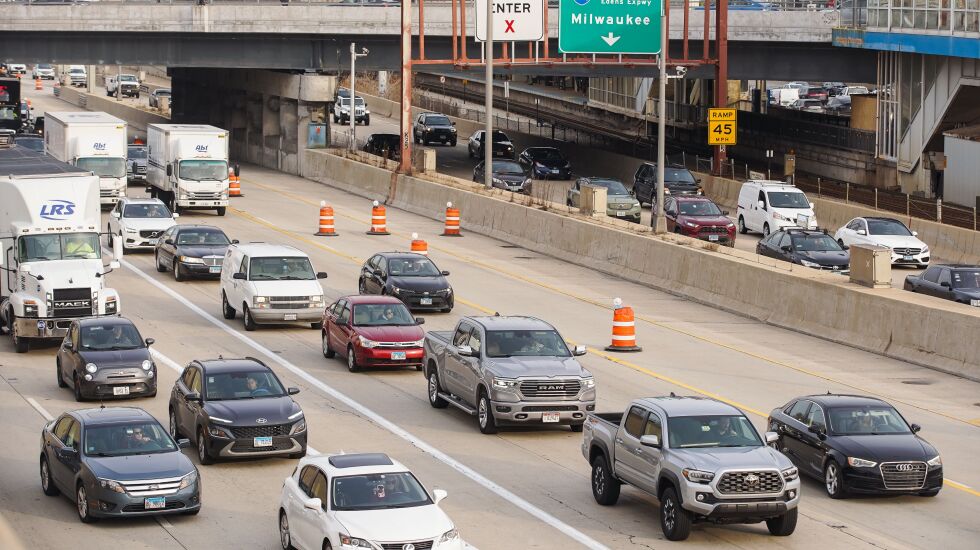
Amancay Kugler drove in on the Kennedy Expressway from the Avondale neighborhood Tuesday morning and noticed her commute downtown took almost twice as long as normal.
“It was slow this morning and slow yesterday morning,” said Kugler, 30, who was dropping off her two children at day care downtown.
She hadn’t been paying attention to the news that there would likely be extra congestion on the inbound lanes of the Kennedy on Tuesday.
“I’ve got two kids. I’m solo parenting this week. So no,” she said.
It’s likely going to get worse for commuters like Kugler and many of the 275,000 drivers who use the Kennedy daily. Illinois Department of Transportation crews set up barricades Monday night where the Edens Expressway merges with the Kennedy all the way south to Irving Park Road, blocking off the left two lanes.
Those lane closures along the Kennedy are expected to be extended a total of 7.5 miles during the next few days to Ohio Street as a two-year construction project gets underway.
“This entire week as we set things up, every single morning when you drive in, you’re going to notice something different,” said Maria Castaneda, an IDOT spokeswoman.
So if you drove in on the Kennedy on Tuesday morning, say from the Irving Park on-ramp, you might not have noticed the lane closures — or any major slowdowns. It took a Chicago Sun-Times reporter jumping on the Kennedy at Irving Park at 7:55 a.m. about 20 minutes to reach the Ohio Street exit, a slightly quicker-than-usual commute time.
Castaneda said construction-related slowdowns were “pretty much as we expected.”
“Obviously, it was tighter, more congested in the area north of” Irving Park, she said.
But North Side commuters aren’t likely to be so lucky Wednesday when lane closures are expected to extend to Fullerton, Castaneda said.
The entire project is expected to be completed in 2025. Bridges along the expressway will be demolished and replaced over the course of the project, taking around five weeks per bridge, according to IDOT.
Larger thoroughfares leading onto the expressway could be backed up as a result of the construction as well, but exits and on-ramps aren’t expected to be closed.
To deal with the expected congestion, IDOT officials recommend public transit or leaving for work earlier — to avoid the worst of the rush hour.
That’s exactly what Christopher Coleman said he plans to do to get to his job on time. He lives on the South Side but works for a plumbing company that does a lot of work on the Northwest Side.
“I’m gonna have to leave earlier in the morning, so it will probably take another 30 minutes to an hour to drive,” he said, adding that it’s also probably going to cost him more money for gas.
“It’s going to be worse,” he said of his commute.
JP O’Rourke lives in Wicker Park but works out of a camera shop in Jefferson Park. As a cinematographer, he said he schedules his job hours around avoiding the worst of morning and evening rush hours.
But with the possibility that the construction and lane closures could lengthen the duration of the gridlock during peak times, he said his work schedule might have to change again.
“I know I’m going to have to be working very odd hours just to avoid the awful commute,” he said.
And public transportation might be an option for others, but it isn’t for him, O’Rourke said, because he’s frequently traveling with several pieces of camera equipment.
A Chicago Transit Authority spokesperson said the agency had no available data on increased ridership Tuesday possibly connected to the construction, but she said the agency is monitoring for any upticks.
Metra saw a “noticeable increase on some trains” Tuesday morning, said Mike Gillis, an agency spokesperson. Beginning April 3, Metra plans to add 12 trains on weekdays to the UP Northwest Line.
“With a major multiyear rehab project scheduled to start on the Kennedy Expressway, this new schedule allows Metra to provide more commuters with a viable and much less stressful alternative to driving,” Metra CEO/Executive Director Jim Derwinski said in a statement.







